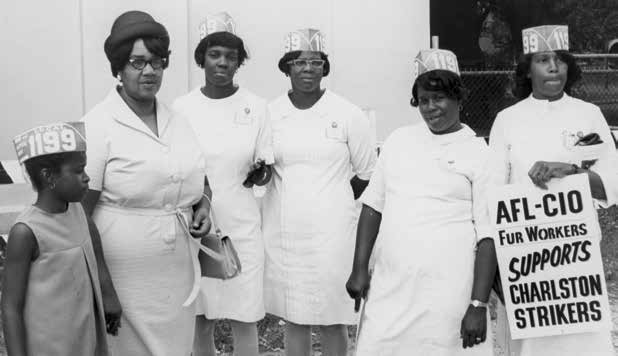OUR HEROES IN GEORGIA’S VANGUARD
January 19, 2021
Women of color have always been on our front lines.

These seniors, an overwhelming majority African American women, count themselves among the much-heralded constituency that have helped end the nightmare of the last four years.
“I’m proud of what we’ve done in Georgia, but our work is not over,” says Alma Shelton, a former patient advocate at the now-closed St. Mary’s Hospital in Brooklyn. She is a proud member of the Retired Members Division chapter, in Georgia where some 2,000 retired 1199ers have relocated.
Dozens of these members were active in November’s election campaign that delivered the state to Joe Biden and Kamala Harris and forced runoffs in both U.S. Senate races.
Today, all eyes are on the state, because the political direction of our nation rests in large part on the outcome of the two Georgia races for the U.S. Senate, which conclude on Jan. 5, 2021. 1199ers and pro-democracy allies throughout the state are working tirelessly to wrest these Senate seats from Republican control, thereby preventing GOP Senate Majority Leader Mitch McConnell (D, KY) from continuing to pack the nation’s courts with far-right judges, serve corporate interests and block legislation in the interests of working people.

In the summer of 2019, Abrams was a guest speaker at the 1199 Training and Education Funds fiftieth anniversary celebration. About the same time, she launched Fair Fight and Fair Fight Action to combat voter suppression in Georgia and Texas. Under Abrams leadership, hundreds of thousands of new voters have been registered in Georgia alone.
“Georgia is where it is because of Stacey Abrams. She has inspired and encouraged us all,” says Yolette Bonhomme, a Manhattan Morningside House NH retiree who now lives in Decatur, Georgia. She and her husband, Alix Bonhomme, a Bronx Albert Einstein retiree, worked with their church to print and mail election literature and to phone bank during the general election.
1199 retirees, many of whom canvassed door-to-door during Abrams 2018 campaign, note that African American women are the staunchest supporters of progressive candidates. Some 93% voted for the Biden-Harris ticket nationwide.
The support of pro-worker and people’s candidates by 1199ers has been consistent throughout its history.
When the Union consisted mainly of white male pharmacy workers, 1199 contributed funds to the 1955 Montgomery bus boycott, led by Dr. Martin Luther King, Jr. The boycott was sparked by Rosa Parks, an NAACP leader who refused to give up her bus seat, and many African American women were on the front lines of this historic demonstration.
Months before Parks’ refusal, 15-year-old Claudette Colvin was also arrested in Birmingham for refusing to give up her seat. For 36 years Colvin was a proud 1199 member and a nurse’s aide at Mary Manning Walsh Nursing Home in Manhattan. She retired in 2004.
Several years after the Montgomery bus boycott, 1199 hired its first woman organizer, Thelma Bowles, an African American Bronx Montefiore LPN, who helped lead the Union’s first hospital organizing campaign.
Countless women of color who grew up in the South, the Caribbean and Puerto Rico joined native New York sisters and led the campaigns throughout New York’s voluntary hospitals and nursing homes, while also active in their local communities and raising families.
Leaders like Puerto Rican Gloria Arana of Mt. Sinai in Manhattan and Bermudan immigrant Hilda Joquin of Beth Israel were champions of the 1959 hospital organizing campaigns.
In the late 1960s, 1199 asked Coretta Scott King to serve as honorary chair of the Union’s national organizing committee. Her rousing oratory, commanding presence at meetings and picket lines, and her media appearances emboldened and energized workers. She helped sustain Mary Moultrie, who led the Charleston, SC, organizing campaign, and many other low-paid African-American workers. The Charleston organizing drive was not successful, but it left its mark on the city and laid the groundwork for later progressive victories.
Leaders like Annie Henry and Carrie Davis of Johns Hopkins Hospital in Baltimore, MD, never fail to mention Coretta Scott King’s example and inspiration in the campaign to organize Johns Hopkins just months after the Charleston drive.
Members at Strong Memorial Hospital in Rochester, NY, say there would be no Rochester 1199 without the work in the 1970s of the late Mattie Best, whom they’ve anointed “Rochester’s Mother of the Union.”
Following the rapid growth of the Union in the late 1990s, 1199 became a more formidable political force. During presidential campaigns, the Union was able to dispatch members and retirees to live and work in battleground states.
Others boarded buses from Union headquarters to work as Weekend Warriors.
In the Georgia presidential campaign, 1199ers worked with other SEIU members and young activists. They and their retired sisters and brothers will continue to participate in voter mobilization and registration efforts through Jan. 5. “We have to pass the baton,” Shelton says. “Young people have vision, and we must use that.”
Shelton says she also does a lot of work through her church and draws strength from it, too.
Yvette Bonhomme and her husband, Alix, also cannot separate their electoral work from their work at church and in the community.
Says Yvette, “The people we pray with [are the same ones] we also push to vote.”
1199 Magazine | November & December 2020

